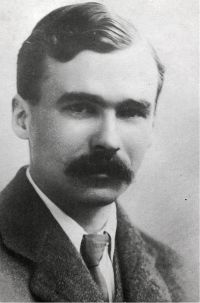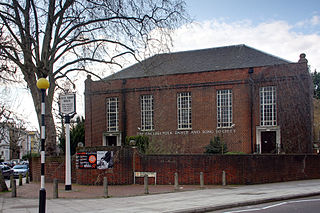Related Research Articles

George Sainton Kaye Butterworth, MC was an English composer who was best known for the orchestral idyll The Banks of Green Willow and his song settings of A. E. Housman's poems from A Shropshire Lad. He was awarded the Military Cross for his gallantry during the fighting at Pozières in the First World War, and died in the Battle of the Somme.

Percy Aldridge Grainger was an Australian-born composer, arranger and pianist who moved to the United States in 1914 and became an American citizen in 1918. In the course of a long and innovative career he played a prominent role in the revival of interest in British folk music in the early years of the 20th century. Although much of his work was experimental and unusual, the piece with which he is most generally associated is his piano arrangement of the folk-dance tune "Country Gardens".
The folk music of England is a tradition-based music which has existed since the later medieval period. It is often contrasted with courtly, classical and later commercial music. Folk music traditionally was preserved and passed on orally within communities, but print and subsequently audio recordings have since become the primary means of transmission. The term is used to refer both to English traditional music and music composed or delivered in a traditional style.

Cecil James Sharp was an English collector of folk songs, folk dances and instrumental music, as well as a lecturer, teacher, composer and musician. He was a key figure in the folk-song revival in England during the Edwardian period. According to Roud's Folk Song in England, Sharp was the country's "single most important figure in the study of folk song and music".
"I Saw Three Ships (Come Sailing In)" is an English Christmas carol, listed as number 700 in the Roud Folk Song Index. The earliest printed version of "I Saw Three Ships" is from the 17th century, possibly Derbyshire, and was also published by William Sandys in 1833. The song was probably traditionally known as "As I Sat On a Sunny Bank", and was particularly popular in Cornwall.

"The Raggle Taggle Gypsy" (Roud 1, Child 200), is a traditional folk song that originated as a Scottish border ballad, and has been popular throughout Britain, Ireland and North America. It concerns a rich lady who runs off to join the gypsies (or one gypsy). Common alternative names are "Gypsy Davy", "The Raggle Taggle Gypsies O", "The Gypsy Laddie(s)", "Black Jack David" (or "Davy") and "Seven Yellow Gypsies".
"Old MacDonald Had a Farm" is a traditional children's song and nursery rhyme about a farmer and the various animals he keeps. Each verse of the song changes the name of the animal and its respective noise. For example, if the verse uses a cow as the animal, then "moo" would be used as the animal's sound. In many versions, the song is cumulative, with the animal sounds from all the earlier verses added to each subsequent verse.

William "Merry" Kimber, was an English Anglo concertina player and Morris dancer who played a key role in the twentieth century revival of Morris Dancing, a form of traditional English folk dancing. He was famous both for his concertina playing and for his fine, upright dancing, such that in his day he was presented in the highest circles of society.

The Vaughan Williams Memorial Library (VWML) is the library and archive of the English Folk Dance and Song Society (EFDSS), located in the society's London headquarters, Cecil Sharp House. It is a multi-media library comprising books, periodicals, audio-visual materials, photographic images and sound recordings, as well as manuscripts, field notes, transcriptions etc. of a number of collectors of folk music and dance traditions in the British Isles. According to A Dictionary of English Folklore, "... by a gradual process of professionalization the VWML has become the most important concentration of material on traditional song, dance, and music in the country."
The English Folk Dance and Song Society is an organisation that promotes English folk music and folk dance. EFDSS was formed in 1932 when two organisations merged: the Folk-Song Society and the English Folk Dance Society. The EFDSS, a member-based organisation, was incorporated in 1935 and became a registered charity in 1963.

"The Two Sisters" is a traditional murder ballad, dating at least as far back as the mid 17th century. The song recounts the tale of a girl drowned by her jealous sister. At least 21 English variants exist under several names, including "Minnorie" or "Binnorie", "The Cruel Sister", "The Wind and Rain", "Dreadful Wind and Rain", "The Bonny Swans" and the "Bonnie Bows of London". The ballad was collected by renowned folklorist Francis J. Child as Child Ballad 10 and is also listed in the Roud Folk Song Index. Whilst the song is thought to originate somewhere around England or Scotland, extremely similar songs have been found throughout Europe, particularly in Scandinavia.
"Geordie" is an English language folk song concerning the trial of the eponymous hero whose lover pleads for his life. It is listed as Child ballad 209 and Number 90 in the Roud Folk Song Index. The ballad was traditionally sung across the English speaking world, particularly in England, Scotland and North America, and was performed with many different melodies and lyrics. In recent times, popular versions have been performed and recorded by numerous artists and groups in different languages, mostly inspired by Joan Baez's 1962 recording based on a traditional version from Somerset, England.

"Fair Margaret and Sweet William" is a traditional English ballad which tells of two lovers, one or both of whom die from heartbreak. Thomas Percy included it in his 1765 Reliques and said that it was quoted as early as 1611 in the Knight of the Burning Pestle. In the United States, variations of Fair Margaret were regarded as folk song as early as 1823.
The Farmer's Curst Wife is a traditional English language folk song listed as Child ballad number 278 and number 160 in the Roud Folk Song Index.
Maud Karpeles OBE, was a British collector of folksongs and dance teacher.
"The Sprig of Thyme", "The Seeds of Love", "Maiden’s Lament", "Garners Gay", "Let No Man Steal Your Thyme" or "Rue" is a traditional British and Irish folk ballad that uses botanical and other symbolism to warn young people of the dangers in taking false lovers. The song was first documented in 1689 and the many variants go by a large number of titles.
The Full English launched in 2013 and is an ongoing English Folk Dance and Song Society (EFDSS) project to create a searchable digital archive of English folk song collections from the early 20th century, thereby preserving and improving the accessibility of these resources. The project is supported by the Heritage Lottery Fund, The Folklore Society, the National Folk Music Fund and the English Miscellany Folk Dance Group. An offshoot of the archive, also in 2013, was an album and concert tour under The Full English name by a collective of UK folk singers.
High Germany, is a traditional folk song, once known throughout England, Ireland and Scotland, with a history spanning hundreds of years. There are three songs known as High Germany. This page focuses on the best known one, the others being The Two Lovers or True Lovers and The Wars of Germany.
Sam Bennett (1865–1951) was an English Morris dancer, fiddler and traditional singer from Ilmington, Warwickshire.
References
- ↑ Walker, Thomas (2011-08-31) [First published 1728]. "The Quaker's Opera (Walker, Thomas) - IMSLP/Petrucci Music Library - Free Public Domain Sheet Music". London. p. 37. Retrieved 2017-12-27.
- ↑ "Country Gardens (Cecil Sharp Manuscript Collection (at Clare College, Cambridge) CJS2/10/946)". The Vaughan Williams Memorial Library. Retrieved 2020-11-10.
- ↑ "Country gardens (VWML Dance and Tune Index DT44334)". The Vaughan Williams Memorial Library. Retrieved 2020-11-10.
- ↑ Bacon, Lionel (1974). A Handbook of Morris Dances. The Morris Ring.
- 1 2 "Country Gardens by Percy Grainger". Windliterature.org. 12 December 2013. Retrieved 12 January 2021.
- ↑ "Grainger (arr. Johnston) - Country Gardens for Clarinet Choir - CC177". United Music and Media Publishers. Retrieved 2020-11-10.
- ↑ "Overview Country Gardens (1919) on ASO - Australia's audio and visual heritage online". Aso.gov.au. Retrieved 12 January 2021.
- ↑ "JIMMIE RODGERS | full Official Chart History | Official Charts Company". Officialcharts.com. Retrieved 12 January 2021.
- ↑ "Cover versions of English Country Garden by Rolf Harris | SecondHandSongs". Secondhandsongs.com. Retrieved 12 January 2021.
- ↑ "Song: Here's to the Crabgrass written by Lou Busch, Allan Sherman | SecondHandSongs". Secondhandsongs.com. Retrieved 12 January 2021.
- ↑ Spitzer, Peter (9 December 2011). "Peter Spitzer Music Blog: Charlie Parker's Musical Quotes". Peterspitzer.blogspot.com. Retrieved 12 January 2021.
- ↑ "Weird Dreams". ClassicReload.com. 15 February 2014. Retrieved 12 January 2021.
- ↑ "Hover Bovver (1983)". rawg.io. 28 August 2019. Retrieved 18 March 2021.